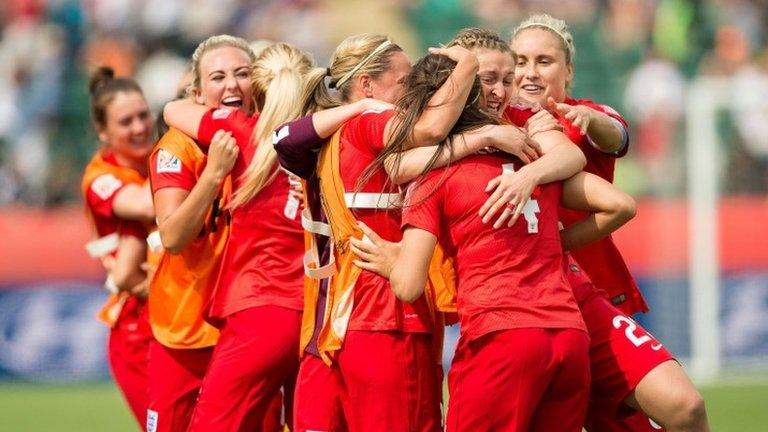Jill Ellis: World Cup-winning US women's coach 'never wanted to coach'
- Published
Meet Jill Ellis, the Englishwoman who won the World Cup, but never planned to be a coach
Can you name the last English person to lift the football World Cup? It is not Bobby Moore or Sir Geoff Hurst - but Jill Ellis, coach of the United States women's national team.
The mastermind behind the USA's success, leading them to a 5-2 victory over Japan in the 2015 final in Canada, is originally from Cowplain near Portsmouth.
Ellis has admitted she did not even want to be a coach, but quit her £25,000 office job and "took a leap of faith" which has now etched her name in the history books.
Now plotting a way for the USA to succeed at the 2019 World Cup in France is her top priority, with Germany the only previous nation to win back-to-back titles in the women's game.
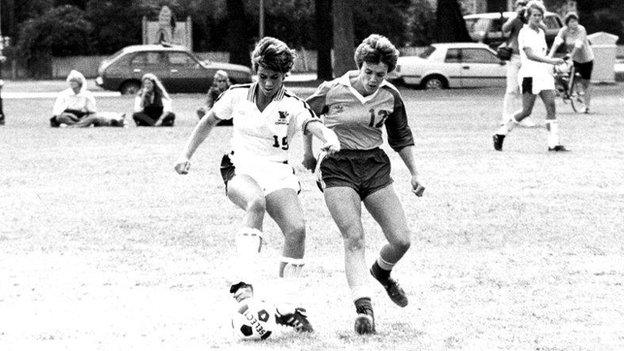
Ellis played football at college but never planned to be a coach
Life around Pompey
"There was a place called Pitt Street in Pompey and my dad used to take us there, my brother and me," Ellis told BBC World Service.
"I remember when the men's game was going on, we would be playing and usually it would end in a fight between my brother and me.
"Those were my first memories of going to watch games. Afterwards my Dad would take me into the clubhouse, and I remember getting a bag of chips and soda."
Ellis' father John is an ex-Royal Marine commando and football ambassador for the UK government, and while he was travelling the world promoting football as a player, his daughter's passion for football was being ignited.
She recalls: "Manchester United was the team my brother followed and I got into it, so I loved watching them play. The FA Cup, Stevie Coppell, Lou Macari, all of those guys in the olden days, it was fun. Those were my earliest memories of watching the game."
In 1980, the Ellis family arrived in North America with her father choosing to set up a football academy in Virginia. He helped nurture future USA coach April Heinrichs, acting as her mentor and later becoming her assistant coach with the national team - laying a path that his daughter would follow.
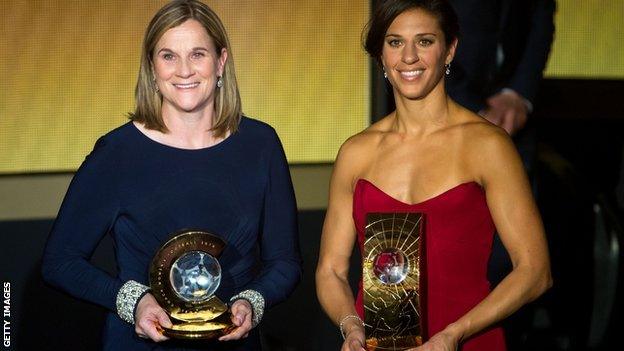
Ellis was named 2015 world coach of the year for women's football
'I never wanted to be a coach'
Despite her family credentials, Ellis never planned to become a coach of any kind, let alone take the most high-profile job in women's football.
"I never actually wanted to be a coach," she said. "I went to college to play some football and get an education.
"I then went off on a different tangent and worked in the business world for a couple of years as a technical writer [for a telecoms company]. I got a call to go and do an assistant [coaching] job at a university."
It was Heinrichs who gave Ellis that first coaching job, at the University of Maryland in 1994.
Ellis added: "I took a jump and a leap of faith. It spiralled since then and I have been able to make a career out of it."
Women's World Cup 2015 final highlights: USA 5-2 Japan
Her father's message
Ellis remembers how her father encouraged her to try a different job, to see what life was like away from football, but when her coaching career became serious, the World Cup-winning coach feels his positive attitude and support gave her huge confidence.
"My dad doesn't throw his experience in my face, in terms of giving me information, he is there if I want him," she said.
"Win, lose or draw, he is always there and sends me a text, so it is nice to have a constant. He is a guy that has lived it and so he understands the pressure, the reward, the frustration and all the emotions that go into coaching."
Ellis would go on to lead the University of California football team to eight National Collegiate Athletic Association (NCAA) semi-finals in 12 years, before joining US Soccer in 2011 as the development director of the national team programme.
Three years later, she received the call to take the national side's head coach role, arguably the most pressurised job in the women's game. Yet within a year she was creating history in Canada as the USA lifted the World Cup for the first time in 16 years.
"It was just pure elation, all the years of hard work," she said.
"It's been a huge privilege for me to work with this group of players and I have an amazing staff, it's very much been a collective effort.
"I say to young coaches, you have to go into it, be who you are, be authentic, put your seatbelt on and enjoy the ride."
It is now tough for Ellis to walk down the street in her new home of Miami without being spotted, after the months of exposure, an open-top bus parade through New York and even a call from the then President of the United States, Barack Obama.
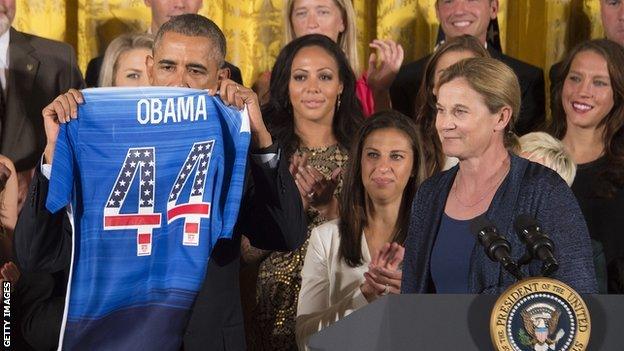
Ellis met President Obama after guiding the USA to the World Cup in 2015
Raising the standard in women's football
"It really is now the global game for women. Nearly every country is investing in sport and there are more pro leagues," she continued.
"I am biased, but I think it has become the premier sport for women in the world. Now though, other countries have a lot more resources and put them into developing their players and the sport.
"If you look at Spain, they are starting to come on the main stage of international football, their youth teams have done very well. With that you get the culture of Spain and the emphasis on technique and possession.
"It is something that we are pushing here with our youth coaches. It is easy as a youth coach to pick the strongest and fastest kid because at that moment they can solve the game physically.
"When you get to the international level you need more than that, you need players with the smarts and the technique to execute."
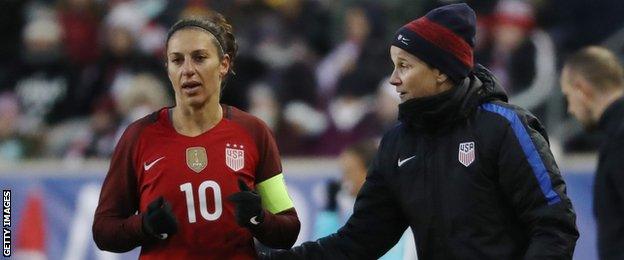
USA captain Carli Lloyd, who scored a hat-trick in the 2015 World Cup final, joined Manchester City earlier this year
What of the future?
The USA have dominated women's football over the past 25 years, winning four Olympic titles along with three World Cups, but Ellis admits repeating that kind of success will now be even tougher to achieve.
"It's great, you coach and you have your team and everything you invest is in your team, but the big picture is our sport and you want to see what is best for it," she added.
"Does it mean more challenges for the team? Yes of course, but people seem to forget that the matches between the top teams have always been close.
"I think very much like the men's game, sure there are teams who can make it very challenging to play and will rely on their physical qualities. But I think you are seeing more and more high-level tactics and teams like Spain becoming formidable on the world stage.
"Certainly the level of play has changed dramatically, the level of athleticism, the technique, coaching and tactics. Everything has just advanced so much with this investment. Obviously I enjoy watching it, but I think it has got a true fan base now."
Jill Ellis was speaking to the BBC World Service as part of the BBC's From Elite to Grassroots women's football series.
- Published7 April 2017
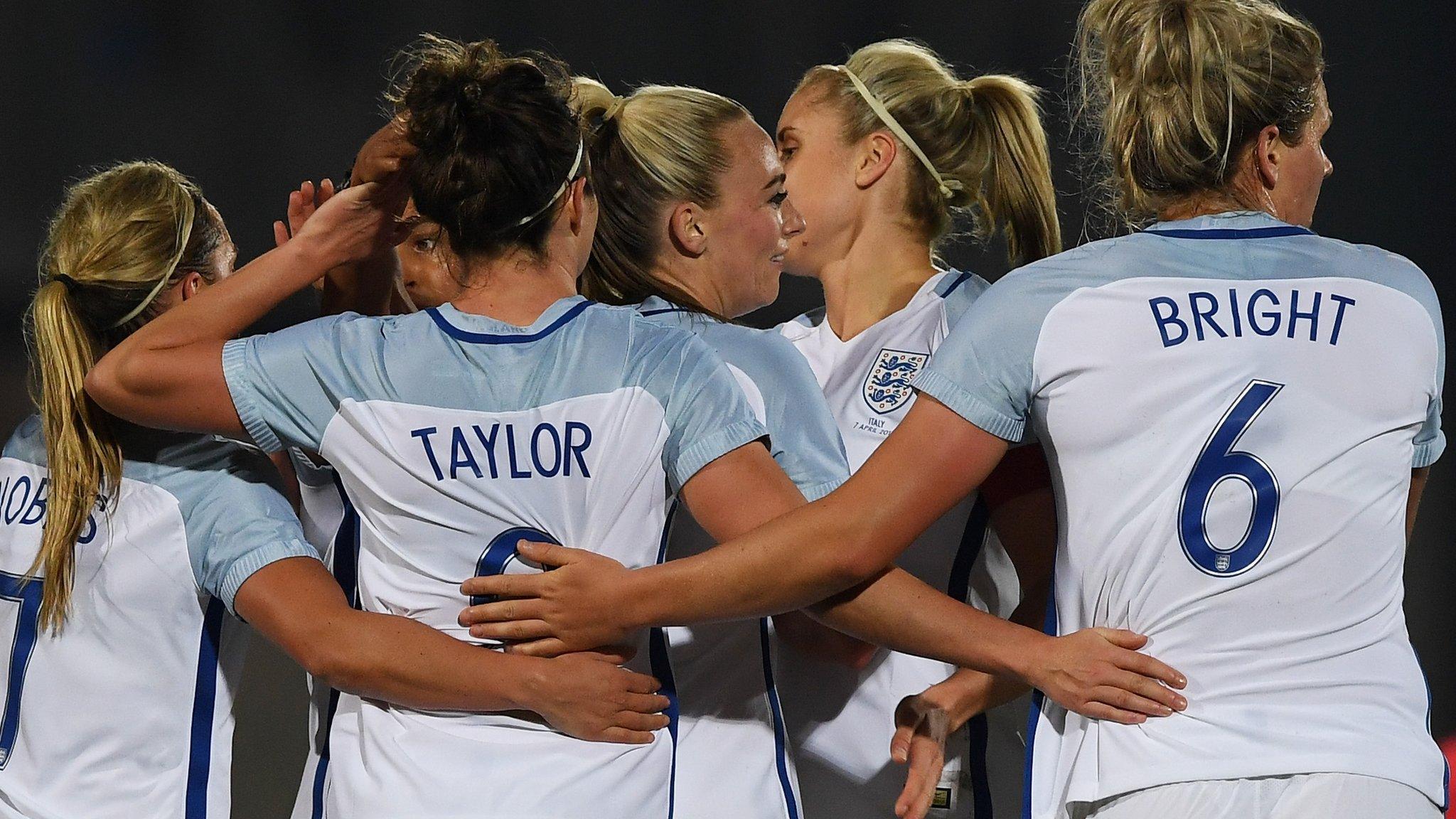
- Published6 July 2015
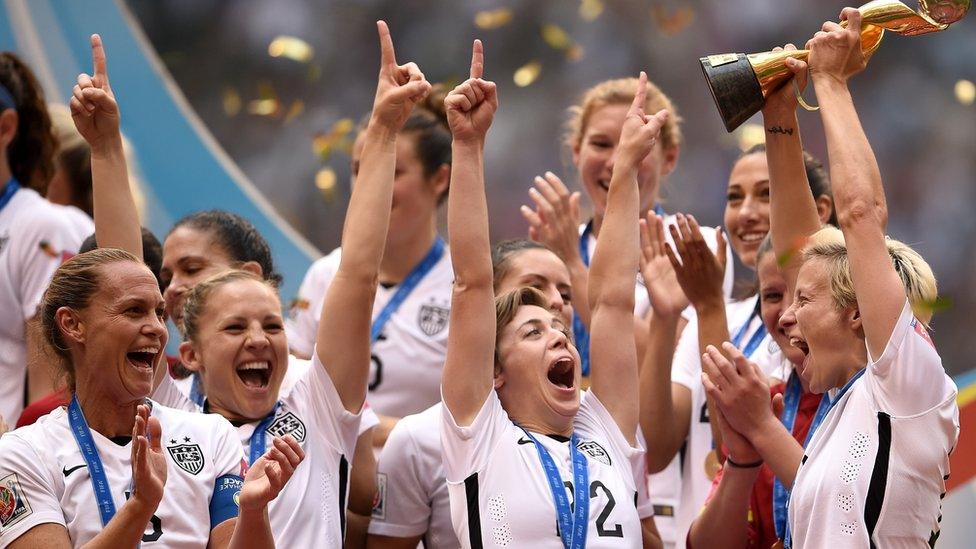
- Published6 July 2015
